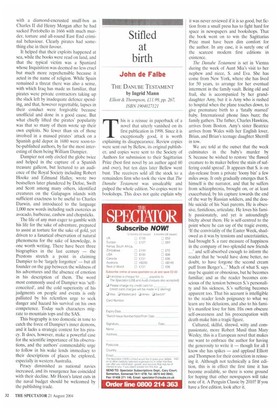Stifled at birth
John de Faibe
THE DANUBE TESTAMENT by Ingrid Mann Elliott & Thompson,111.99, pp. 267, ISBN 1904027121 This is a reissue in paperback of a novel that utterly vanished on its first publication in 1998. Since it is exceptionally good, it is worth explaining its disappearance. Review copies were sent out by Bellew, its original publisher, and copies were sent to the Society of Authors for submission to their Sagittarius Prize (best first novel by an author aged 60 and over), but ten days later Bellew went bust. The receivers sold all the stock to a remainders firm who took the view that The Danube Testament was unsaleable and pulped the whole edition. No copies went to bookshops. This does not quite explain why
it was never reviewed if it is so good, but fiction from a small press has to fight hard for space in newspapers and bookshops. That the book went on to win the Sagittarius Prize must have been dim comfort for the author. In any case, it is surely one of the scarcest modem first editions in existence.
The Danube Testament is set in Vienna during the week of Aunt Mia's visit to her
nephew and niece, S. and Eva. She has come from New York, where she has lived for 50 years, to arrange for her eventual interment in the family vault. Being old and frail, she is accompanied by her granddaughter Amy, but it is Amy who is rushed to hospital when the plane touches down, to give premature birth to a 'fatally marred' baby. International phone lines buzz; the family gathers. The father, Charles Hawkins, arrives from Boston. Amy's sister Beatrice arrives from Wales with her English lover, Brian, and Brian's teenage daughter Sherrill in tow.
We are told at the outset that the week culminates in the baby's murder by S. because he wished to restore 'the flawed creature to its maker before the stain of suffering could spread'. It appears that S. is on day-release from a private 'loony bin' a few miles away. It only gradually emerges that S. himself is the narrator, and that he suffers from schizophrenia, brought on, or at least exacerbated, by his capture towards the end of the war by Russian soldiers, and the dou ble suicide of his Nazi parents. He is obses sive, fastidious, articulate. He loves his family passionately, and yet is astoundingly bitchy about them. He is self-centred to the point where he can say of the tragic events, 'If the conviviality of the Easter Week, shad owed as it was by tensions and uncertainties, had brought S. a rare measure of happiness in the company of two splendid new friends ...' and self-absorbed enough to inform the reader that he 'would have done better, no doubt, to have forgone the second cream
puff from Berger's...' Much of what S. says
may be quaint or obnoxious, but he becomes familiar; and as the reader becomes con scious of the tension between S.'s personali ty and his sickness, S.'s suffering becomes apparent too. That his account is intelligible to the reader lends poignancy to what we learn are his delusions, and also to his family's manifest love for him. His own obscure self-awareness and his preoccupation with death make him a tragic figure.
Cultured, skilful, shrewd, witty and compassionate, more Robert Musil than Mary Wesley, this is a European novel that makes me want to embrace the author for having the generosity to write it — though for all I know she has spikes — and applaud Elliott and Thompson for their conviction in reissuing it. Although not technically a first edition, this is in effect the first time it has become available, so there is some ground for hoping that other newspapers will take note of it. A Penguin Classic by 2010? If you have a first edition, look after it.


























































 Previous page
Previous page